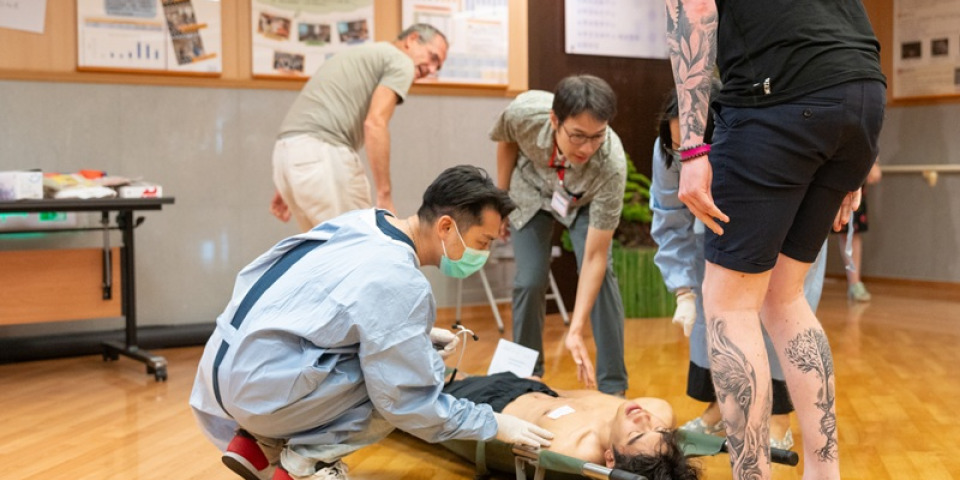關注國際醫療人道救援的重要資訊,了解無國界醫生在各地的工作,接收最新活動消息與緊急報告,知道更多參與和協助的訊息。
Ready to respond: MSF brings together medical professionals in multi-disciplinary training for life-saving teams

In conflict zones, during natural disasters, and epidemics, teams from Médecins Sans Frontières/Doctors Without Borders (MSF) work in challenging environments to provide medical care. To ensure healthcare professionals are prepared for these humanitarian assignments, MSF conducted its Multi-disciplinary Enhanced Deployment in Critical Surgical Care (MEDICS) training in Taiwan. The intensive six-day program brought together 25 medical professionals from 15 regions and countries, with experience and specialisations in emergency medicine, intensive care, surgery, gynaecology, and anaesthesiology.
The MEDICS training reflects MSF's commitment to delivering quality medical care for vulnerable people caught in crisis. Through peer-to-peer learning supported by experienced facilitators, participants develop both the technical expertise and mental readiness needed for humanitarian medical work at the frontlines of need.
The program combined theory and practice through hands-on exercises and group discussions. In the final day's mass casualty incident simulation, participants faced a scenario that mirrored the chaos and urgency of real-life crises – managing 18 casualties arriving after a bomb blast.
Participants were assigned roles of MSF medical and non-medical staff, while volunteers acted as patients presenting with distinct trauma injuries. The team assessed the wounded patients and then prioritised them according to urgency. Initial assessments follow the Airway, Breathing, Circulation and Mental status approach.
Depending on the initial assessment, patients are the triaged into different categories based on the severity of injury and urgency of care required: Red – emergency cases needing immediate intervention; Yellow – urgent cases where treatment may be delayed but require close monitoring; Green – non-urgent cases; Blue – cases that require treatment beyond available capacity or palliative services; and Grey – for patients who are in cardiac arrest where resuscitation efforts will no longer be provided. The mass casualty incident simulation, where volunteer actors presenting with injuries simulated with special effects make-up, concluded with a debriefing involving both training participants and actors.
"During a mass casualty incident, it's quite chaotic. It's not something which we often see in our normal lives," explains Dr Shazeer Majeed, MSF Surgical Care Referent. "We wanted to give them the foundational information on how they could work as a team to provide safe and quality care to our patients in the field."
The practical approach is essential for preparing medical professionals for humanitarian work. "They will be confronted with very sick patients, without the resources that they are used to having where they usually work. This training prepares our teams to adapt, innovate, and save lives," says Dr Séverine Caluwaerts, MSF Obstetrics and Gynecology Referent.
Equally important is the emphasis on diversity and collaboration. "MSF training matters because it's a unique moment where professionals from different parts of the world get together and exchange experiences," says Christelle Plumier, MSF’s staff pool manager for surgeons, anaesthesiologists, gynaecologists, and epidemiologists. "Putting together all these specialists with varied backgrounds, it's exactly the reality that they will be facing working in our different field projects."
This reality resonates strongly with medical professionals who have worked in MSF projects before. "Having just returned from Gaza's Nasser Hospital, I can say that professional medical expertise alone isn't enough," explains Dr Wu Yi-Chun, a plastic surgeon who participated in the MEDICS training. "It brings together like-minded medical professionals from diverse backgrounds who share the same humanitarian values. Here, we learn from experienced field workers who understand the realities, challenges and struggles we face in crisis situations."
For new recruits like Dr Rayman Wong, an obstetrician-gynaecologist heading to Tanzania for his first assignment, the training builds readiness. "Beyond the technical aspects, it's about developing the mental preparation to work in challenging conditions. The simulations helped me understand how to stay focused and provide the best possible care for our patients."
For medical and non-medical professionals interested in joining MSF, visit our recruitment page to learn more about the roles, criteria, and selection process.
